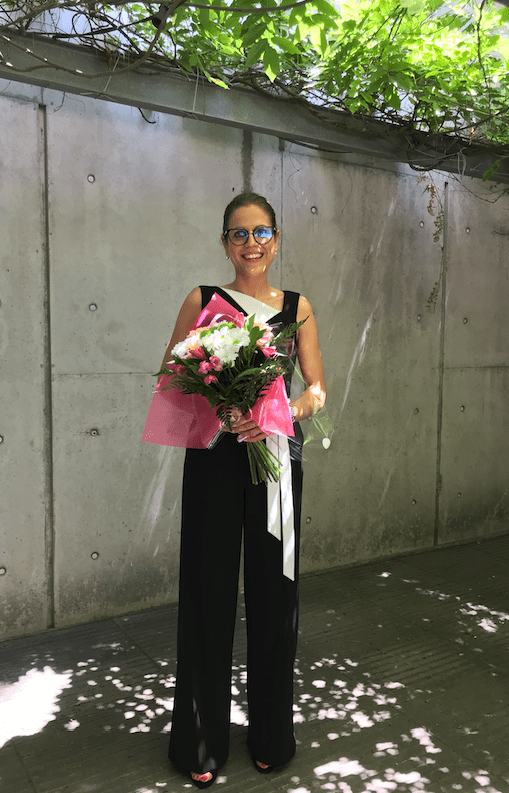New doctor at ICIQ: congratulations Dr. Casadevall!
Carla Casadevall, PhD student under the supervision of Prof. Julio Lloret-Fillol (ICIQ), has defended her PhD Thesis entitled “Mechanistic Studies of Water Oxidation Catalyzed by Homogeneous Iron and Ruthenium Complexes and Light-driven Organic Reductions with a Dual Cobalt/Copper Catalytic System” (assigned to the Department of Inorganic & Physical Chemistry of the Universitat Rovira i Virgili) publicly on July 22nd at the ICIQ Auditorium.
The members of the examining committee were: Alceo Macchionni (University of Perugia), Agustí Lledós (Autonomous University of Barcelona) and Wesley R. Browne (University of Groningen).

Dr. Casadevall with the members of the evaluation committee and her supervisor, Prof. Júlio Lloret-Fillol.
Dr. Casadevall is from Palafrugell, a small town near Girona, where she studied Chemistry. During high school and university, she did theatre for more than 10 years and participated at the FITAG (the Girona international theatre festival) where, together with her colleagues, she performed in front of international audiences. She also enjoys the big outdoors, running – although she confesses the PhD hasn’t allowed her much time to pursue this pleasure –, gastronomic tours and travelling.
Why did you become a scientist? What would you want to achieve as a scientist?
In high school, I already enjoyed studying science and wanted to go to university and study either physics or chemistry. Since I started university, I’ve known I wanted to pursue a PhD and devote my career to do research. As a scientist, I’m ambitious: I want to help make a positive change and to give back to society. At ICIQ we do basic science which will not solve global problems, but the results this basic science yields will be the stepping stones of future revolutions.
From the lessons learnt at ICIQ, which one do you value the most?
I’ve learnt many things: thanks to the experiences I’ve gone through at ICIQ I’ve become the scientist I am right now. I value having learnt to tackle problems from the right angle, learning to look for the right person to collaborate with at each moment. I’ve been very lucky that my group had many different postdoctoral researchers, experts on their own field, from whom I’ve learnt a lot. My thesis has been a multidisciplinary one, and that has given me a lot of perspective. I think science is moving towards the interdisciplinarity of research, and we need to be prepared to work this way and to tackle this kind of challenges.
What ICIQ funny moment you´ll never forget?
I will never ever forget several funny and lovely moments I spent with my labmates at ICIQ. It is difficult to choose one because I have lived almost 5 amazing years doing my favourite thing (research) surrounded by very competent and nice people. I will never forget exhausting synchrotron trips in which despite being extremely tired due to the lack of sleep, the emotion of measuring and seeing the results was keeping us super excited. I particularly remember one beam trip with Sergi and Vlad in which Sergi and myself were somewhere around Paris trying to reach the hrotron synchrotron, but we had not slept much since we took the earliest flight, and we were like zombies lost in Paris with the trolley and falling asleep in all the stops on our way.
What do you wish you had known at the beginning of your PhD?
If I started my thesis all over again, I would be way more efficient and productive. When you start the thesis, you don’t have the background and perspective you have at the end. That’s because, by the end, you’ve developed your critical thinking skills, which help you focus on what is more interesting scientifically.
Where are you going next? What will you do there?
I’ll be around ICIQ till the end of summer to wrap up several papers we have submitted recently and some others that we will submit in the near future. On September I’ll join Prof. Erwin Reisner’s group in Cambridge as a postdoctoral researcher. The group investigates the interface between biological systems and synthetic materials for the production of solar fuels and chemical products in the artificial photosynthesis frame. My project will consist of combining bacteria with molecular catalysts to reduce CO2 to solar fuels. I’ll also be appointed as the coordinator of the UK Solar Fuel Network for Artificial Photosynthesis, it’s a very exciting new stage!
If you were a lab instrument which would you be?
Nowadays science is multidisciplinary so it is impossible to choose only one instrument. Indeed, only one instrument or technique is not enough to compete at the current level chemical transformations are investigated and aimed to be understood. Nevertheless one of the instruments I like the most is the X-ray diffractometer, because it allows to “see” the structure of the compounds we are creating or the intermediates we are trapping and this is wonderful! I also ended up loving the glovebox, because we have shared basically all working hours together for almost 5 years!
Related news

Let's create a brighter future
Join our team to work with renowned researchers, tackle groundbreaking
projects and contribute to meaningful scientific advancements







 20-12-2024
20-12-2024 


















